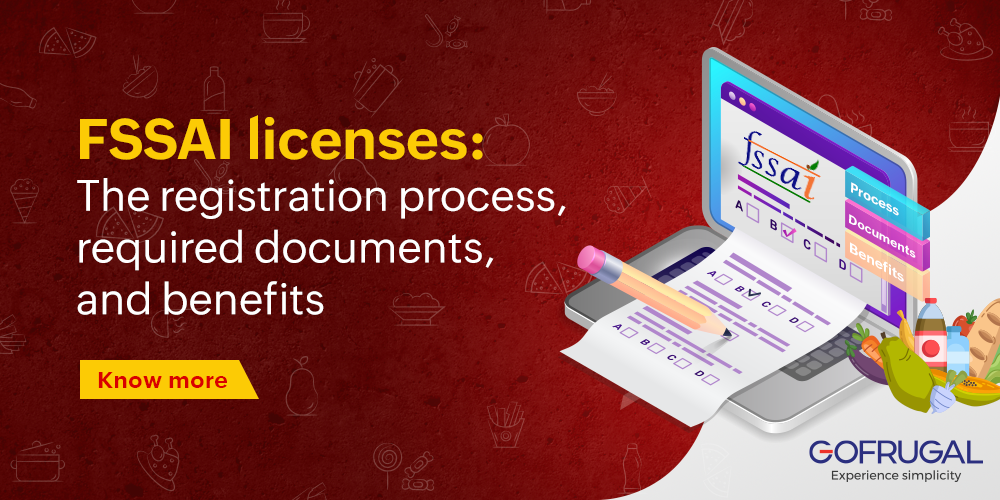Key takeaways:
- Understand the importance of FSSAI registration for food safety and compliance.
- Learn the different types of FSSAI registrations and eligibility requirements.
- Discover the step-by-step process, documents needed, and costs involved in obtaining and renewing your FSSAI license.
- Find out the penalties for noncompliance and why securing FSSAI registration is essential for your business.
In the competitive landscape of the food industry in India, securing an FSSAI registration is the most important step for individuals venturing into the culinary realm. Whether you dream of opening a restaurant, bakery, hotel, cloud kitchen, food stall, or even supermarkets, the Food Safety and Standards Authority of India (FSSAI) registration is a mandatory prerequisite. This holds true for every entity or individual engaged in the diverse spectrum of activities within the food business, be it manufacturing, preparation, selling, transportation, distribution, or storage of food articles and products. As daunting as it seems, registering with the FSSAI can be very easy if you follow this step-by-step guide.
Contents
- What is FSSAI?
- What is an FSSAI registration?
- Benefits of procuring FSSAI registration
- Types of FSSAI registration
- Who requires FSSAI registration?
- FSSAI registration eligibility
- FSSAI license eligibility
- What is the process for online FSSAI registration?
- Documents required for obtaining an FSSAI registration/license
- FSSAI license cost
- What is the penalty for noncompliance?
- How to renew your registration/license after expiry?
- FAQs
What is FSSAI?
The FSSAI stands for the Food Safety and Standards Authority of India. It functions as the governing body overseeing the entirety of the food business landscape in India. Established as an autonomous entity under the Ministry of Health and Family Welfare, Government of India, the FSSAI plays a pivotal role in regulating and monitoring food-related activities.
This regulatory authority finds its roots in the Food Safety and Standards Act, 2006 (FSS Act), a comprehensive statute dedicated to food safety and regulation in India. The FSSAI operates with the primary objective of subjecting food products to rigorous quality checks, mitigating the risks of food adulteration and the sale of substandard items.
One of the FSSAI’s core responsibilities is the registration and licensing of Food Business Operators (FBOs) across India. Additionally, it establishes and enforces rules and regulations governing the operations of food businesses throughout the country.
What is an FSSAI registration?
Distinguishing between an FSSAI registration and an FSSAI license is crucial, and depends on the size and nature of the business. Food Business Operators (FBOs) are mandated to secure the appropriate registration or license in alignment with the scale of their operations.
An FSSAI registration is characterized by a distinctive 14-digit identification number, prominently featured on all food packaging. This unique identifier not only denotes the assembling state, but also holds information about the producer’s permit. The stringent registration process is designed to instill accountability in FBOs, compelling them to uphold the quality standards of their food products.
The entire licensing and registration procedure, along with its prerequisites, is governed by the Food Safety & Standards (Licensing and Registration of Food Business) Regulations of 2011.
Benefits of procuring FSSAI registration
FSSAI registration offers several benefits to Food Business Operators (FBOs) in the food industry. Here are some key advantages:
- Instills trust by assuring consumers that the food products meet safety and quality standards, enhancing brand credibility.
- Enforces specific quality standards, ensuring overall food product quality and safety, minimizing the risk of substandard items.
- Allows access into new markets and collaboration with retailers, facilitating market access and potential business growth.
- Streamlines operations by providing a standardized identity, making it easier for FBOs to establish legitimacy in the food industry.
- Helps maintain compliance with labeling requirements to educate consumers about nutritional content, fostering transparency and informed choices.
- Facilitates international trade by meeting specific food safety standards, easing export and import processes.
- Provides additional support, resources, and participation in government initiatives.
- Reduces the risk of legal actions and penalties, safeguarding against fines and product recalls for unregistered FBOs.
Types of FSSAI registration
FSSAI registration is categorized into three types, each tailored to the specific characteristics of Food Business Operators (FBOs). The type of registration required is determined by factors such as turnover, production capacity, and the nature of the business.
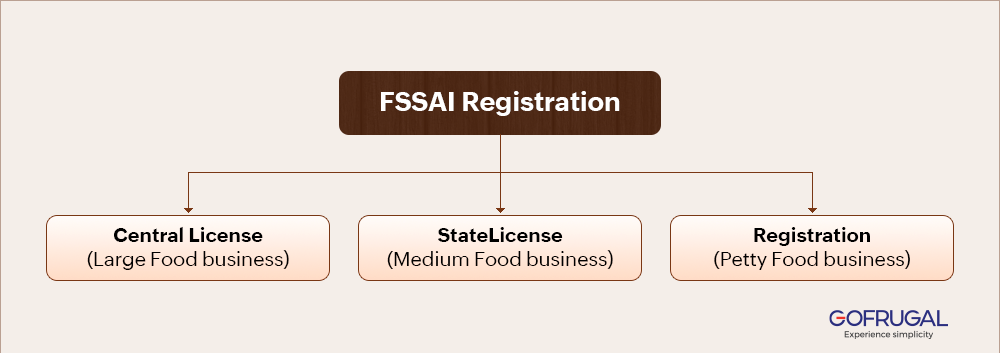
FSSAI basic registration
- Eligibility criteria: FBOs with an annual turnover of less than Rs. 12 lakh.
- Registration form: Form A.
- Description: Designed for smaller businesses, an FSSAI basic registration is a prerequisite for those with a turnover falling below the Rs. 12 lakh threshold. The registration process involves the completion of Form A.
FSSAI state license
- Eligibility criteria: FBOs with an annual turnover exceeding Rs. 12 lakh, but not surpassing Rs. 20 crore.
- Registration form: Form B.
- Description: Aimed at medium-sized enterprises, an FSSAI state license is mandatory for businesses with an annual turnover between Rs. 12 lakh and Rs. 20 crore. You must fill out Form B to obtain this license.
FSSAI central license
- Eligibility criteria: FBOs with an annual turnover exceeding Rs. 20 crore.
- Registration form: Form B.
- Description: Geared towards larger enterprises, an FSSAI central license is imperative for businesses with an annual turnover surpassing Rs. 20 crore. Similar to the state license, the application process involves the completion of Form B.
Who requires FSSAI registration?
Businesses involved in various food-related activities are obligated to obtain an FSSAI registration/license. This includes:
- Petty retailers
- Food stalls
- Hawkers
- Dairy units
- Vegetable oil processors
- Slaughterhouses
- Meat and fish markets
- Processing units
- Food manufacturers
- Cold storage facilities
- Food transporters
- Wholesalers
- Hotels
- Restaurants
- Catering services, and more.
The specific type of FSSAI license or registration needed depends on the eligibility criteria for each business category.
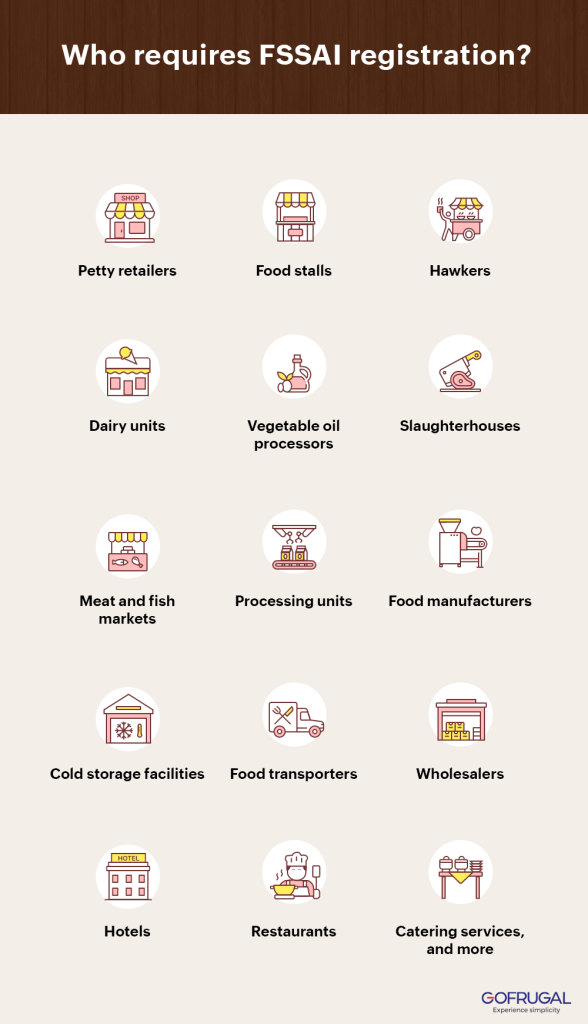
FSSAI registration eligibility
The eligibility criteria for each kind of business and type of license/registration is provided on the FSSAI website.
- FBOs with an annual turnover not exceeding Rs. 12 lakh.
- Small retailers specializing in food products.
- Individuals engaged in the self-manufacture or sale of food articles.
- Temporary stallholders involved in food sales.
- Individuals distributing food at religious or social gatherings, excluding caterers.
- Small-scale or cottage industries operating in the food business.
- Small businesses with specific food capacity limits.
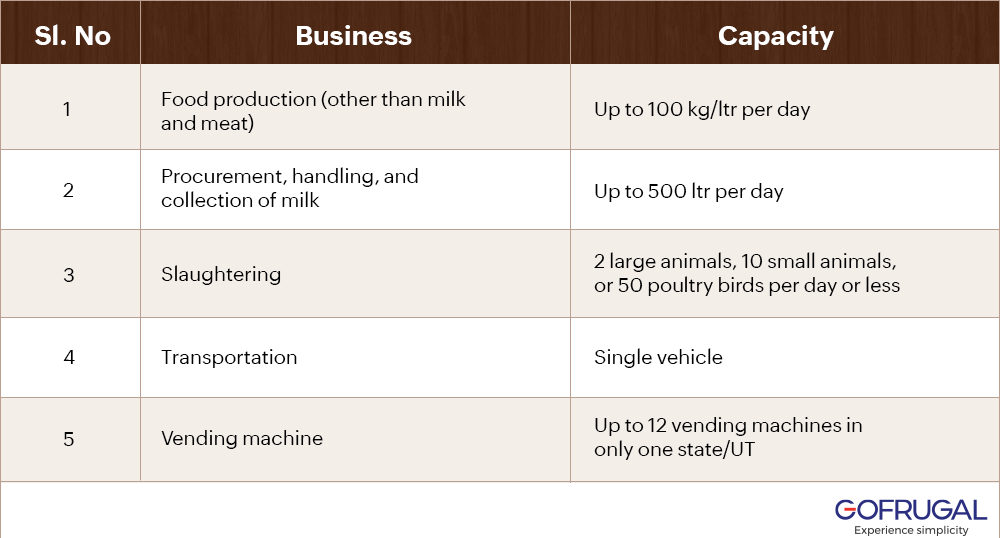
FSSAI license eligibility
Other FBOs, excluding small-scale businesses, must obtain the FSSAI license. This license is categorized into State FSSAI License and Central FSSAI License, depending on the business size, whether it falls under medium or large scale.
State FSSAI License
A State FSSAI License is required for FBOs operating medium-sized manufacturing units, transportation, marketing, trading, and more. This registration is obtained from the State Government and applies to businesses falling within the following criteria:
- FBOs with a turnover ranging from Rs 12 lakh to Rs 20 crore (Rs 30 crore for transportation and wholesale businesses).
- All grain, cereal, and pulse milling units, with no restrictions on production capacity.
- Medium-scale businesses with specific food capacity limits.
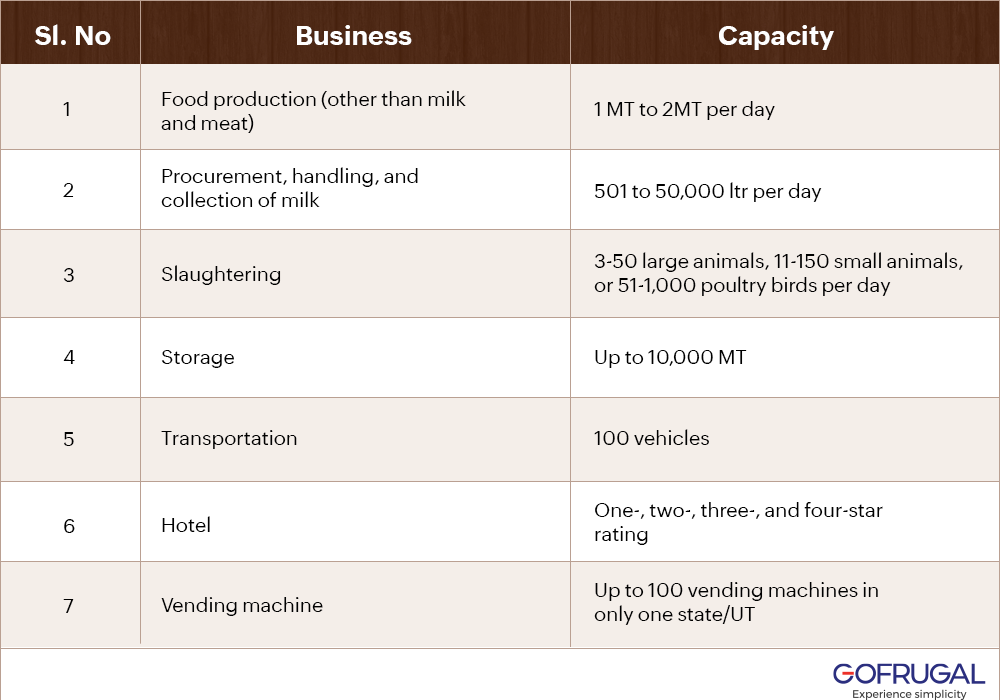
The issued license is valid for a maximum of five years and a minimum of one year.
Central FSSAI License
A Central FSSAI License is required for FBOs involved in large-scale manufacturing, importing, and exporting within the food industry. This registration is obtained from the Central Government and applies to businesses falling within the following criteria:
- FBOs with a turnover exceeding Rs 20 crore (Rs 30 crore for transportation and wholesale businesses).
- The following FBOs, regardless of turnover or business size:
- Food businesses operating in two or more states.
- Importers and exporters.
- Proprietary food and non-specified food.
- Food or health supplements and nutraceuticals.
- Radiation processing of foods.
- Food Business Activities at premises of Central Government Agencies.
- Caterers, restaurants, canteens, hawkers, or petty retailers at the premises of railroad stations.
- Ecommerce food businesses.
- Large-scale businesses with specific food capacity limits.

The license issued has a duration ranging from a minimum of one year to a maximum of five years.
What is the process for online FSSAI registration?
FBOs can secure FSSAI registration online by completing and submitting either Form A (Application for Registration) or Form B (Application for State and Central License) on the FoSCoS portal. Alternatively, registration can be pursued offline by submitting the designated forms (Form A or Form B) to the Food and Safety Department.
Accompanying the FSSAI registration form, mandatory documents must be either uploaded to the FoSCos portal during the online application or physically submitted along with the application to the Food and Safety Department. The department will review the submitted documents and may conduct a food premises inspection if deemed necessary.
Within seven days of receiving the application, whether physically or through the FoSCoS portal, the department will either accept or reject the FSSAI registration form. In case of rejection, the decision will be communicated to the applicant in writing.
Upon satisfaction with the criteria, the department will issue an FSSAI registration certificate containing the registration number, applicant’s photo, and email address. The certificate can be downloaded by logging into the FoSCoS portal. FBOs are required to prominently display their FSSAI registration certificate during business hours at their place of business.
Documents required for obtaining an FSSAI registration/license
To obtain an FSSAI basic registration, FSSAI state license, or FSSAI central license, the following documents are required:
General documents
- Photo IDs of the food business operators.
- Business constitution certificate, such as partnership deed, certificate of incorporation, shop and establishment license, or other business registration certificates.
- Proof of possession of business premises, including rental agreement, NOC from the owner of the rented premises, utility bills, or something similar.
- Food safety management system plan.
- List of food products manufactured or processed.
- Bank account information.
- Supporting documents (if required), such as NOC by Municipality or Panchayat, Health NOC, copy of license from the manufacturer, or something similar.
Documents required for State License (Medium Food Business Operator)
- Form B completed and signed.
- Plan of the processing unit showing dimensions and operation-wise area allocation.
- List of directors/partners/proprietor with address, contact details, and photo ID.
- Name and list of equipment and machinery used with the number and installed capacity.
- Authority letter from the manufacturer nominating a responsible person with name and address.
- Analysis report of water to be used in the process to confirm portability.
- Copy of certificate obtained under Coop Act 1861/Multi-State Coop Act 2002.
Documents required for Central License (Large Food Business Operators)
- Form B completed and signed.
- Plan of the processing unit showing dimensions and operation-wise area allocation.
- List of directors/partners/proprietor with address, contact details, and photo ID.
- Name and list of equipment and machinery used with the number and installed capacity.
- Authority letter from the manufacturer nominating a responsible person with name and address.
- Analysis report of water to be used in the process to confirm portability.
- Source of raw material for milk, meat, and the like.
- Recall plan wherever applicable.
- Ministry of Commerce Certificate for 100% EOU.
- NOC/PA document issued by the FSSAI.
- IE code document issued by the DGFT.
- Form IX.
- Certificate from the Ministry of Tourism.
- Supporting documents for proof of turnover and transportation.
- Declaration form.
FSSAI license cost
The fees for FSSAI registration vary depending on the type of registration. Here are the applicable fees.
- FSSAI Basic Registration: Rs.100
- FSSAI State License: Between Rs.2,000 to Rs.5,000 (depends on the type of business carried out)
- FSSAI Central License: Rs.7,500
*Note: Fees current as of November, 2023.
What is the penalty for noncompliance?
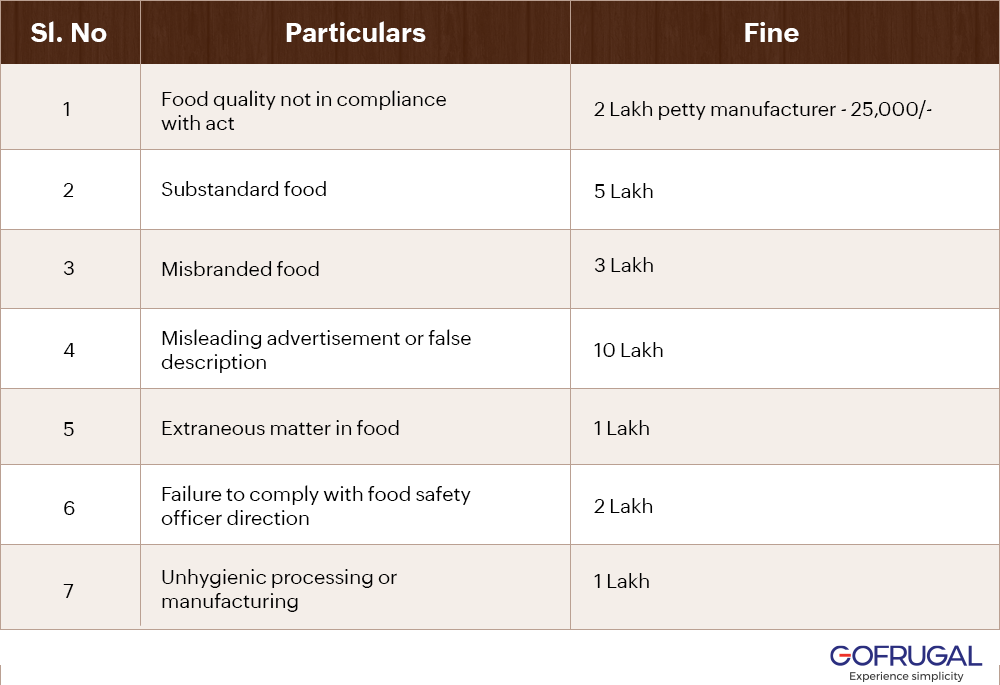
How to renew your registration/license after expiry?
Renewing an FSSAI license is crucial for the continued operation of a food business. Whether the license is issued for a validity of one or five years, businesses must initiate the renewal process at least 30 days before the current license expires to ensure uninterrupted compliance.
To learn about these processes, please check out the FSSAI’s official YouTube channel here!
With this detailed guide, you now have a fair idea of the documents required for food establishments, and the process for acquiring an FSSAI license in India.
Want to learn more about other licenses needed for food establishments? Read our detailed guide here!
DISCLAIMER: Licenses and policies associated with food establishments are subject to change based on decisions by the concerned regulatory authorities. Readers should treat this blog as reference material for understanding the licenses required to open a food establishment in India.
FAQs
How do I download the FSSAI registration certificate from the FoSCoS portal?
When the FSSAI authorities issue your FSSAI registration certificate, it will be sent to the email address you provided as the Food Business Operator (FBO). Additionally, you have the option to download the certificate from the FoSCoS website. Follow these simple steps:
- Log in to the FoSCoS website.
- Navigate to the dashboard and click on the Issued tab.
- The FSSAI registration certificate details will be visible on the screen.
- Click on the FSSAI registration number.
- The certificate will open, and you’ll find a download button on the screen.
What details are mentioned on the FSSAI registration certificate?
The FSSAI registration certificate comprises essential details about the Food Business Operator (FBO). It includes:
- Your business’s official name and physical address.
- The specific location where your food business operates.
- A description of the nature of your food-related activities.
- The duration for which the FSSAI registration certificate remains valid.
What is the FSSAI license validity period in India?
The validity period for an FSSAI license can range from one to five years. The Food Safety and Standards Authority of India (FSSAI) has established distinct validity periods for different licenses and food products.
It should be noted that the fee structure is directly influenced by both the type of food license and the chosen validity period. Therefore, fees will vary based on the specific requirements of your food business and the duration for which you seek FSSAI certification. It’s essential to consider these factors when applying for or renewing your FSSAI license.
Can a license be modified? What is the fee for such a modification?
If you need to make changes to the information on your FSSAI license, you can submit an application for modification. The process allows you to update details without incurring charges for alterations, except for changes to the license information.
If you need to modify the information within the license, a modification fee equivalent to a one-year license fee may apply. This fee ensures that your license information accurately reflects your current business details.
There are no charges for modifications to other parts of the license. This flexibility enables businesses to adapt their FSSAI license as needed without incurring additional costs.
